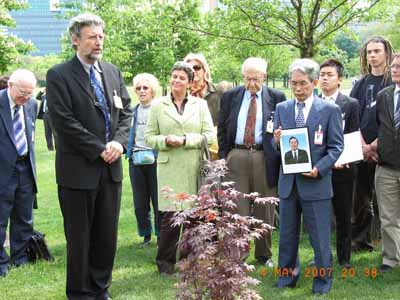 |
In a park in Vienna
friends plant a tree
in memory of Mayor Itoh
Ceremony in memory of Nagasaki Mayor Iccho Itoh, slain on April 17th by a member of an organized crime syndicate.
The ceremony was held on May 4th in the park behind the Vienna International Center during the NPT PrepCom.
|
At the beginning of May, I went to Vienna to attend the first Preparatory Committee for the 2010 Review Conference of the Parties to the Treaty on the Non-Proliferation of Nuclear Weapons. When I returned to Tokyo, after the PrepCom had been running for one week, discussion of substantive issues had not even begun. Iran was blocking consensus on the agenda, because the draft under consideration stated that the PrepCom reaffirmed "the need for full compliance with the Treaty".
One would have thought that was a reasonable thing to reaffirm, but evidently Iran feared being made a scapegoat. NGOs and diplomats from other governments pointed out to the Iranian delegation that this phrase not only referred to the state of compliance of non-nuclear weapons states (NNWS) with their obligations under Article 4 of the NPT. It also referred to the nuclear weapons states' (NWS) (lack of) compliance with their obligations under Article 6. Finally Iran accepted a compromise proposed by South Africa spelling out the understanding that "compliance with the Treaty" means with all provisions of the Treaty. This enabled substantive discussions to begin, albeit much later than scheduled.
The NPT regime faces numerous grave challenges, relating to both nuclear proliferation and disarmament. My main purpose in going to Vienna was to address one of these challenges. I wanted to draw attention to the threat posed by the US-India nuclear deal. This deal would undermine the basis of the NPT by allowing India, which is not a member of the NPT and which possesses and has tested nuclear weapons, to engage in nuclear trade with the US and, through amendment of the rules of the Nuclear Suppliers Group of countries (NSG), with the rest of the world (see NIT 117). My objective was to turn disparate national NGO campaigns into an international campaign and to generate formal discussion among NPT states parties.
Thanks to support from the other NGOs present, the first objective was achieved. It was agreed at the Abolition 2000 Annual General Meeting, held on May 6th, that a one-year working group would be set up within the Abolition 2000 network. Already people from seven countries have expressed interest in being involved. Hopefully this will be expanded over the life of the project.
As for the second objective, some of the governmental statements referred (directly or indirectly) to the US-India deal. Some governments spoke of the need to universalize the NPT. It was encouraging that Japan mentioned India, Pakistan and Israel by name when reiterating its call that they accede to the NPT as non-nuclear weapons states. Switzerland went further, saying, "...the project of co-operation in the field of civilian nuclear energy between India and the USA will not be without consequences for the non-proliferation regime based on the NPT. If this project is carried out it will call into question the validity of the compromise which enabled a consensus to be found on the extension of the NPT at the 1995 Review Conference."
Hoping to stimulate more debate, the Abolition 2000 AGM approved a statement to be handed to diplomats recommending that they challenge the US to show how the US-India nuclear deal can be reconciled with the NPT consensus position. The statement made clear that we believe the deal is inconsistent with the consensus position adopted at previous NPT Review Conferences and with UN Security Resolution 1172.
Our purpose in taking this approach was twofold. Firstly, we wanted to expand the debate beyond the NSG. The terms of the legislation passed by Congress in December last year require Congressional approval of a bilateral agreement between the US and India, negotiation of an IAEA safeguards agreement, and consensus agreement of the NSG. However, it is clearly inappropriate for the NSG, with only 45 member countries, most of which are members of nuclear alliances, to have the final word on the deal when it affects all NPT parties, the majority of which are not members of such alliances. Secondly, we wanted to provoke a debate in which the onus was on the US to justify the deal in terms of the NPT. By demonstrating that precedent is against the deal, we hope to prevent a situation where the burden of proof is shifted to those NPT parties which are concerned about the deal.
We are in no doubt that if the deal were to proceed in its current form it would have a profoundly negative impact on the NPT and the non-proliferation regime in general. We are confident too that the US will fail to convince NPT states parties that the deal is consistent with the current consensus. We recognize that the current situation in which four nuclear-armed states (the above-mentioned three plus North Korea) remain outside the NPT is untenable and that the failure of the five officially recognized NWS to dismantle their nuclear arsenals is the key obstacle to progress. A way forward must be found on these and other issues, but the US-India nuclear deal, which would effectively increase the number of officially recognized NWS from five to six, is not the solution.
Philip White (CNIC international liaison officer & NIT editor)

